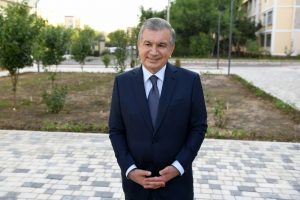In celebration of the recent successful constitutional referendum, Uzbek President Shavkat Mirziyouev called for snap presidential elections. While the ballot will feature four names, Mirziyoyev is expected to win in a landslide.
If that last sentence looks familiar, that’s because I wrote nearly the same thing just two years ago in 2021 when Uzbekistan held its last presidential election.
Only candidates nominated by officially registered political parties can contest the presidential election. Ahead of the 2021 election, the banned Erk party tried get registered and put forward a popular singer, Jahongir Otajonov, as its candidate. Otajonov quit the race after being attacked. Another unregistered party, the Truth and Development party headed by former Termez University rector Hidirnazar Allaqulov, was harassed as it tried to organize, too, and ultimately failed to achieve registration.
Mirziyoyev sailed into his second term with a reported 80.1 percent of the vote against a field of four potemkin candidates — the heads of Uzbekistan’s other four officially registered political parties, all of which express pro-government positions and rarely, if ever, criticize the administration or the ruling Uzbekistan Liberal Democratic Party (shorted to OʻzLiDeP in Uzbek).
The field is set for the July snap election with Mirziyoyev nominated by OʻzLiDeP and also supported by Milliy Tiklanish, which decided on May 13 to support Mirziyoyev rather than run its own candidate. The party’s head, Alisher Qodirov, in a speech argued in favor of standing behind Mirziyoyev, saying that “the current difficult times require us to unite,” and “we need to firmly rally around the incumbent president.”
That’s a theme we can expect to hear more of. While the other parties have nominated their own candidates, they are unlikely to truly challenge Mirziyoyev or criticize the government.
The Ecological Party nominated its leader Abdushukur Khamzaev, who became party chairman in December and was previously a former deputy chief of the State Forestry Committee and a former director of the Research Institute of Forestry. The People’s Democratic Party of Uzbekistan (PDPU) nominated its leader, Ulugbek Inoyatov, who has led the party since 2019 (in the 2021 election the party ran its deputy head, the race’s only woman, Maksuda Varisova). And the Social Democratic Party “Adolat” nominated Robakhon Makhmudova, the first deputy chairperson of the Supreme Court (note: “Adolat” means justice.) Makhmudova’s judicial powers have been suspended so she can run.
Had he chosen to run, Milliy Tiklanish’s leader Qodirov would have been the only repeat contender.
For the curious, the other names on the ballot in 2021 were Qodirov (Milliy Tiklanish), Narzullo Oblomurodov (Ecological Party), Bahrom Abduhalimov (Adolat), and Maksuda Varisova (PDPU). Qodirov remains in the Legislative Chamber as a deputy speaker; Varisova is also a member of the Legislative Chamber; Oblomurodov became minister of ecology a few months after the 2021 election; and it’s not clear to me what’s become of Abduhalimov.
In his May 8 speech heralding the passage of the constitutional referendum, Mriziyoyev made the case for a snap presidential election. “Our Basic Law [the Constitution] stipulates that the people are the only source of state power. From this point of view, in the updated system of state power, a mandate should be given only to a leader whom our people trust,” he said.
It’s common democratic parlance to frame an election — particularly an early or snap election — as seeking a “mandate” from the people, and that’s the framing Mirziyoyev would prefer. But it’s not much of a mandate if there are no other possible victors.
Instead, what this election seeks to do is cement Mirziyoyev into power. The constitutional referendum serves to reset the clock on the two-term limit for the Uzbek presidency, nullifying his previous two terms and opening the door to two more terms — this time seven years apiece. Barring unexpected events (and one can never predict the future), Mirziyoyev is all-but-guaranteed a hold on the presidency through 2037. By 2037, Mirziyoyev will be 80.

































